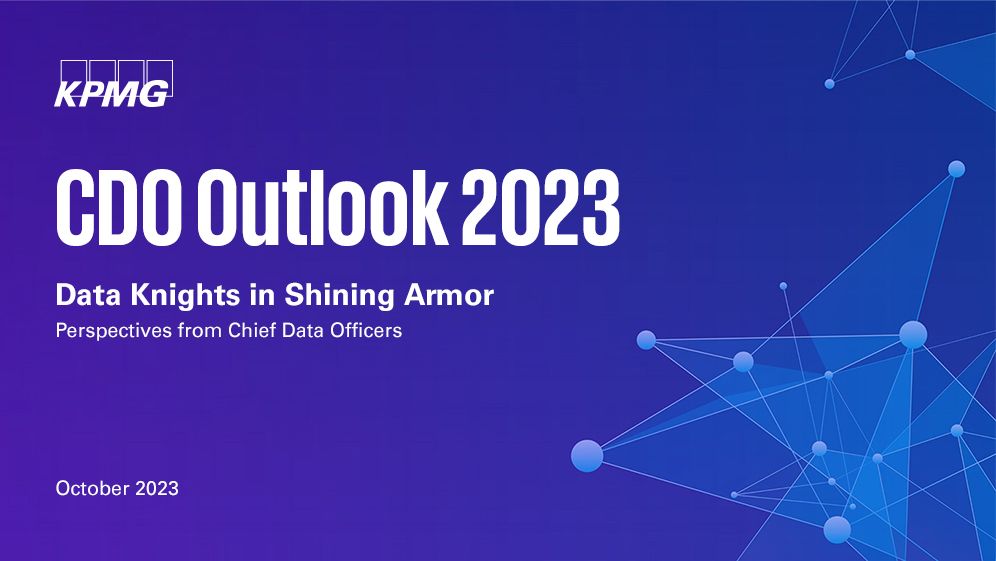As a part of CDO Outlook 2023, conversations with CDOs and their teams provides emerging perspectives into their long-term outlook on data and digital landscapes and reveals shifts in strategies where organisations are using data to reset their digital agenda.
Key emerging perspectives from CDOs today
CDOs at the forefront of data-led transformation
CDOs are appointed as the strategic leaders who drive data innovation, foster a data-driven culture, and contribute significantly to an organisation’s overall success in the digital age. Over 70% of CDOs identify themselves as Data Strategists and Collaborators
Seat at the table
CDO is fast becoming the must-have position at the leadership table as it intends to deliver critical strategic improvements - CDOs role, influence, and impact are determined by the reporting structure to C-Suite. 82% of CDOs report to a member of the C-Suite
Going beyond defensive
CDOs are no longer playing it safe with a defensive strategy - they have taken strategic pivot towards an offensive approach. 56% CDOs have identified legacy system/complex data infrastructure as their key challenge
Modernising the data estate
CDOs believe that technology is accelerating the delivery of emerging analytics use-cases. Platform modernisation overcomes current key challenges – dependency on legacy systems, interoperability and integration, etc. 69% CDOs are investing in data quality initiatives
Scaling up with AI and cognitive technologies
CDOs see AI and other cognitive technologies as means to scaling up data management by leveraging it for classification, cataloging, quality, security and workflows. Some key focus areas where organisations are gearing up are generative AI, automated governance and quality, etc. Nearly 60% CDOs are seeking to adopt intelligent and AI-enabled data management
Productising data
CDOs shifting towards adopting data product-outlook and culture to curate and deploy data products for analytics use-cases. Purpose is ‘value creation’ through curating high-quality reusable data and analytics products to empower consumers. Only 16% CDOs were successfully able to arrive and implement direct data monetisation via data-as-a-product.
Formalising value from data
CDOs are being asked to demonstrate tangible business outcomes and commercial value. Key challenge remains to ascertain revenue increase, opportunity cost saved and competitive advantages by data initiatives. 66% CDOs have confirmed reduction in cost via improved efficiency / automation / faster time to market as their primary ROI Metric
Crossing the cultural chasm
Change management defines the ways of engagement with stakeholders to increase awareness and buy-in to change, and drive end-user readiness and adoption. Data literacy is not just a KRA anymore, but a critical KPI for CDOs and data offices. 72% have confirmed that while data literacy programmes are in place in their organisations, the level varies across multiple business functions
Path to value realization
- CDOs powering data-driven transformation: As organisations embark on data led transformation initiatives, CDOs are increasingly appointed as the strategic leaders who can drive data innovation, foster a data-driven culture, and contribute significantly to an organisation’s overall success in the digital age.
- Data offices: The engine for transformation: The ambition is to focus both on execution and alignment to provide data marketplace experience for informed decision-making. The CDO’s focus is to drive business value by ensuring that data is available, trustable and monetisable, not just for all within the enterprise but also to the ecosystems of partners, customers and suppliers. We observed a rise in centers of excellence (COE) focusing on delivering this capability to the business and comes under the purview of a data office. Data offices are better suited to own the setup and operations of a data-focused COE, from analysing the entire data supply chain to educating, governing and driving business value.
- The building blocks: CDOs are keen to leverage data offices and design platforms that can provide data-as-a-service. Data lifecycle management and platforms as a service emerge as a common wishlist. CDOs can navigate alignment and execution by building four key pillars of data-led transformation:
- Synergising business and data strategy: Clearly for data and AI to outperform and deliver on their true potential, it is important that the entire data and technology organisation shape themselves as change agents and work with zero-degree separation with the business.
- Harnessing the modern data estate: From only a subset of data being made available to data being generated right through the data supply chain, CDOs are now the prime enablers for the modern data estate. A consistent technology stack coordinates data collection, integration and management, enables teams to perform high quality real-time customer analytics, and effectively collaborate and consume those insights through integration with business processes. While building a robust ecosystem, the focus on modernising is based on four essential elements : Cloud native architecture, Self service ecosystem, Data-as-a-product and API integration.
- Building trust in data: As a guardian of trust, the CDO must focus on imbibing data trust by design. There are numerous factors which impact Trust in data - from being accurate, secure, compliant, and accessible to the right people to being explainable, auditable, governable and reliable. The future is at the cusp of being driven largely by AI decision making. AI also holds the potential to introduce new challenges and risks. Hence, we need to build trust as a design metric and build responsible AI
- Weaving data into the fabric of organisational culture: Data culture is the collective understanding and alignment of all the people in an enterprise for leveraging data to drive better business performance. As a CDO, the data value chain is completely owned and delivered through the data office, and it is just right for the CDO to drive culture. A truly data-driven business makes strategic decisions based on data analysis and interpretation, to better contextualise its actions, personalise its messaging, and drive a more customer-centric approach. To weave data culture as the golden thread in the cultural fabric of the enterprise, a CDO must consider the following recommendations : a culture of services, look at data as a strategic asset, shared success from shared responsibility, leverage technology.
Key contacts



